First introduced in 2008, the Petroleum Industry Bill (PIB) is Nigerian government’s effort to enact a single legislation to address the legal, fiscal and regulatory frameworks governing the oil and gas industry. Following controversies and uncertainties surrounding earlier versions, the executive arm of government introduced a revised PIB to the National Assembly in 2012. Following responses from interest groups including Social Action and other civil society and community groups that demanded for better provisions to address the impacts of oil and gas on local communities and the overall growth and development of the country, legislators have introduced some amendments to the Bill. This Briefing Paper by Social Action explores those amendments to determine strengths and makes recommendations to address areas of weakness.. Read Full Report
Category: Publications
Banished for Oil:The untold tory of Environmental Exiles of Ogoniland
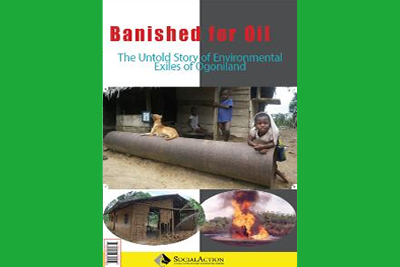
BANISHED FOR OIL: The Untold Stories of Environmental Exiles of Ogoniland exposes ongoing displacement and forced migration resulting from oil pollution in Ogoniland. The report presents the untold stories of the members of Bue-Leh and Busuu communities in Khana Local Government Area of Rivers State, Niger Delta region of Nigeria who have all deserted their homes for almost a decade following oil spills, explosions and fires from installations of the Shell Petroleum Development Company (SPDC) and Nigerian Petroleum Development Company (NPDC).
With the clean-up of Ogoniland as recommended by the United Nations Environmental Programme (UNEP) yet to commence, Social Action is publishing this story to raise awareness about the worsening state of Ogoni environment and the need for immediate actions from the government and all responsible parties to address the clean-up of the environment and the resettlement and compensation of displaced community members. Read Full Report
Crude Business : Oil Theft, Communities and Poverty in Nigeria.
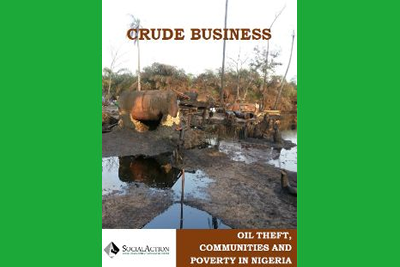
Based on field investigations in Bayelsa, Delta and Rivers States, this report by Social Action presents the cases of illegal artisanal refineries in the Niger Delta as a more recent manifestation of the historical problem of oil theft in Nigeria, which includes the looting of public revenues from the petroleum industry. The report shows that oil theft and the artisanal refining that it enables, are twin threats to legitimate civic engagement, environmental sustainability, and the physical health and livelihoods of its operators and the people living in the Niger Delta communities. With billions of dollars in lost public revenues, crude oil theft adversely affects the socio-economic well-being of the majority of Nigerians who still live in poverty and destitution. The report highlights the need to improve the governance of natural resources and makes concrete recommendations for the government, civil society groups and affected communities. Read full report
Still Polluted : Monitoring Government and Shell’s Response to UNEP’s Environmental Assessment of Ogoniland
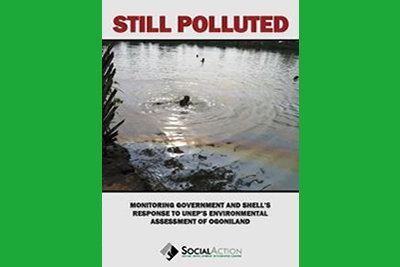
The Social Action has today released a new report, STILL POLLUTED: Monitoring Government and Shell’s Response to UNEP’s Environmental Assessment of Ogoniland. The report is a product of two years monitoring of the effort of the Nigerian government and oil companies to address the remediation of the environmentally-devastated Ogoniland through the implementation of the concrete recommendations in the report by the United Nations Environmental Programme (UNEP). The federal government of Nigeria in 2008 invited UNEP to carry out an assessment of the pollution in Ogoniland. UNEP released its report on Ogoni environment on August 4, 2011. The UNEP Report contained major revelations and recommendations needed to be attended to by clean-up and environmental remediation exercises.
The report by Social Action reveals that the response of the Nigerian government has fallen far short of expectations, in view of its responsibility to safeguard the environment, as enshrined in Section 20 of the 1999 Constitution of Nigeria. The government has done anything worthwhile to restore the Ogoni environment, three years after the UNEP report was released. Even emergency measures such as the provision of alternative sources of drinking water have not been taken seriously by the government. Ogoni community members continue to drink from badly contaminated water wells and bathe in badly polluted streams. Read Full Report
Seeing REDD : Communities, Forests and Carbon Trading in Nigeria
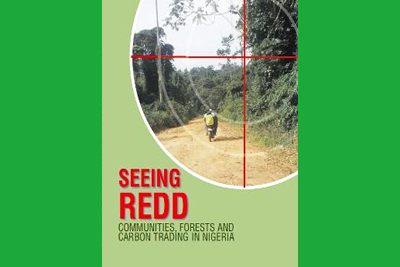
The new report released today by Social Action, highlights how forest dependent communities in Cross River State, SouthEast Nigeria, are losing rights and livelihoods, as their forests are being locked down by the government, which seeks cash through a United Nations-backed ‘carbon trading’ scheme, Reducing Emissions from Deforestation and Forest Degradation (REDD+).The report shows how the implementation of the REDD+ mechanism is having a devastating effect on the economies of affected communities around the Cross River forests. With neither adequate consultation nor alternative livelihood options, community members, who have depended on the forests for generations, are now being victimised by government agents following a ban imposed on economic and cultural activities in the delineated forests.
The report shows how communities are grappling with being implicated in the false solutions to the problem of climate change. While community members suffer the negative effects of climate change which they did not create, they are, through schemes like REDD, liable to being criminalised in the process of enforcing carbon market policies
Campaign Votes
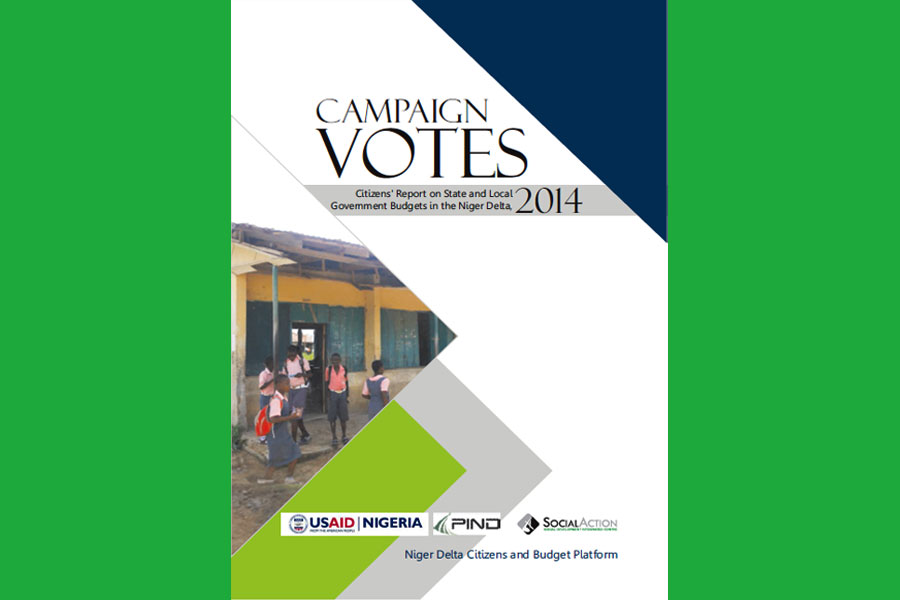
This report is a product of yearlong budget advocacy activities by members of the Niger Delta Citizens and Budget Platform. It begins with a background section which addresses a range of issues which impacted Nigeria’s economy in 2014, with greater emphasis on happenings in the Niger Delta. In writing the background section, careful study has been made of major events and trends that shaped Nigeria in 2014.
The section on State government budgets in the Niger Delta is a study of the fiscal processes bordering on the income and expenditure trends of Akwa Ibom, Bayelsa, Delta, Edo and Rivers states. The report is based on data relevant to the 2013 fiscal year, but provides evidence and data from as far back as 2007 to show trends and allow comparisons. Read full report
Pardoning Impunity
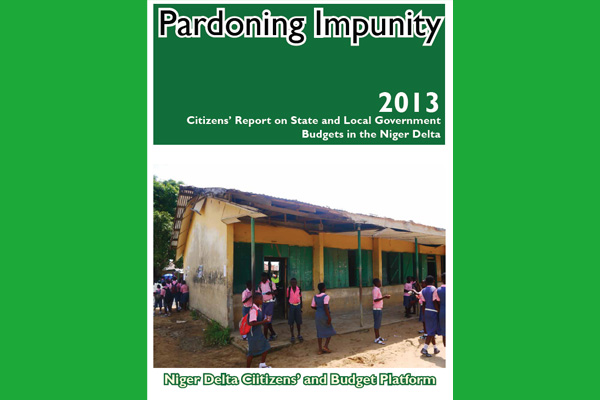
2013 witnessed economic downturns and political upheavals for Nigeria. From declining crude oil revenues, to being ranked the worst place for a child to be born; Nigeria fared badly on major global indices. Neither did the welfare of Nigerians improve in 2013. With life expectancy placed at 52 years and 68% of the population existing on less than $1.25 a day, Nigeria ranked behind African countries like Angola, Burundi, the Democratic Republic of Congo, Ethiopia, Liberia, Mali, Mozambique, Niger, Rwanda, Sierra Leone and Tanzania.
Pardoning Impunity is a product of yearlong field evaluation of performance, budget reviews and interviews with local residents and relevant government officials in 4 of the richest states of the Niger Delta- Akwa Ibom, Bayelsa Delta, Edo and Rivers states. The study analyzes the relation between the 2013 budgets of the states and their policy commitments. It appraises randomly selected projects in the key sectors of Education, Health and Food Sufficiency. The findings are insightful and reveal why development still eludes the majority of Nigerians. Read Full Report
Killing for Banana:Government Land Grab, Violence and the Fogotten Rights of Ogoni Farmers
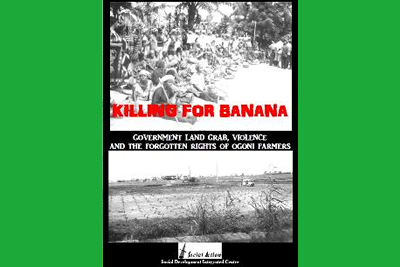
Despite the opposition of thousands of rural smallholder farmers, the Rivers State Government is adamant about its plans to appropriate over 2,000 hectares of ancestral farmlands of Ogoni communities in Tai and Khana Local Government Areas (LGAs) of the state. The state government intends to hand over the land to a private company registered in Mexico, Union De Iniciativa S.A. de C.V., for the development of a commercial banana plantation. This is a prominent example of property speculation via so-called public-private partnerships, which leads to displacement of urban and rural populations. Read full report
Media Briefing on Outcome of Flood Disaster Management in Bayelsa and Rivers States
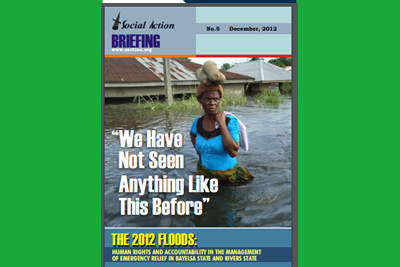
Social Action is calling for probe into the death of Mrs Maureen Lucky, an HIV positive woman who was ejected from Okwuzi flood relief camp in Ogba/Egbema/Ndoni Local Government Area of Rivers State on the orders of Mr. Tele Ikuru, the Chairman of The Rivers State Flood Management Committee and Deputy Governor of the State. Mrs. Lucky, an indigene of Okwuzi community was one of the many persons whose homes were submerged by the recent flooding that occurred in parts of the state and country. She along with her children subsequently went to seek refuge in the camp set up by the state government in Okwuzi. Following reports by Social Action about the condition of Mrs. Lucky and other sick residents in the camps, the Deputy Governor Mr. Tele Ikuru and the Chairman of the Local Government Council, Mr Raymond Wokocha, visited the Okwuzi camp where they ordered the forceful eviction of the Mrs. Lucky who, with her children, ended up in an uncompleted building where she died a few days later, on November 24th 2012. Read Full Report
EIA Report: Compromise of Community Rights
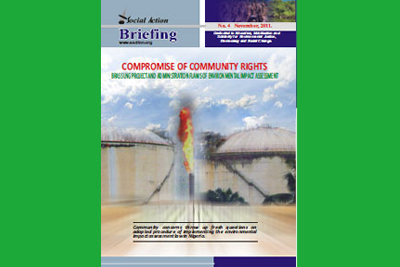
The Brass Liquefied Natural Gas (Brass LNG) project is one of many ventures intended to harness Nigeria’s abundant natural gas reserves in the Niger Delta region of the country. With projections for an increase in global demand for natural gas, the Brass LNG, and similar projects, promise significant revenues for the government and huge profits for corporate promoters. Host communities of the Brass LNG also hope that the project will bring ‘development’ to areas that have borne negative impacts of over fifty years of oil and gas exploitation. Read Full Report
